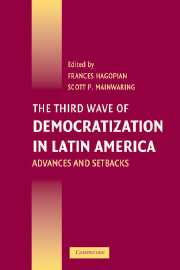Book contents
- Frontmatter
- Contents
- List of Figures
- List of Tables
- List of contributors
- Acknowledgments
- Introduction: The Third Wave of Democratization in Latin America
- 1 Latin American Democratization since 1978: Democratic Transitions, Breakdowns, and Erosions
- PART I THREE DEMOCRATIC GIANTS WITH AUTHORITARIAN PASTS: ARGENTINA, BRAZIL, AND MEXICO
- 2 Argentina: Democratic Survival amidst Economic Failure
- 3 The Growing Sustainability of Brazil's Low-Quality Democracy
- 4 The Demise of Mexico's One-Party Dominant Regime: Elite Choices and the Masses in the Establishment of Democracy
- PART II UNEXPECTED DEMOCRACIES IN UNLIKELY COUNTRIES: BOLIVIA, EL SALVADOR, AND GUATEMALA
- PART III DEMOCRATIC EROSIONS IN THE THIRD WAVE: COLOMBIA, PERU, AND VENEZUELA
- PART IV Conclusions
- References
- Index
4 - The Demise of Mexico's One-Party Dominant Regime: Elite Choices and the Masses in the Establishment of Democracy
Published online by Cambridge University Press: 05 September 2012
- Frontmatter
- Contents
- List of Figures
- List of Tables
- List of contributors
- Acknowledgments
- Introduction: The Third Wave of Democratization in Latin America
- 1 Latin American Democratization since 1978: Democratic Transitions, Breakdowns, and Erosions
- PART I THREE DEMOCRATIC GIANTS WITH AUTHORITARIAN PASTS: ARGENTINA, BRAZIL, AND MEXICO
- 2 Argentina: Democratic Survival amidst Economic Failure
- 3 The Growing Sustainability of Brazil's Low-Quality Democracy
- 4 The Demise of Mexico's One-Party Dominant Regime: Elite Choices and the Masses in the Establishment of Democracy
- PART II UNEXPECTED DEMOCRACIES IN UNLIKELY COUNTRIES: BOLIVIA, EL SALVADOR, AND GUATEMALA
- PART III DEMOCRATIC EROSIONS IN THE THIRD WAVE: COLOMBIA, PERU, AND VENEZUELA
- PART IV Conclusions
- References
- Index
Summary
The Mexican Partido Revolucionario Institucional (PRI; Institutional Revolutionary Party) was one of the most resilient autocrats in the world, holding office uninterruptedly for seventy years. Unlike single parties in most of Africa and the former Soviet bloc, the PRI stayed in power without constitutionally banning opposition parties or employing systematic repression. If we were to take Przeworski's dictum that “democracy is a system in which parties lose elections” (1991: 10), Mexico can unquestionably not be classified as democratic until 2000, when the PRI lost the presidency. Thus, from the onset of the democratization wave that swept the Latin American region starting in 1980, it took Mexico more than twenty years to democratize.
Why was the PRI so resilient? What accounts for its ultimate demise? In this chapter, I emphasize three sources of the PRI's capacity to survive: (a) the party's relative immunity to elite splitting; (b) the authoritarian nature of electoral institutions; and (c) the party's massive electoral support. I then explore how each of these pillars of the PRI regime was transformed, eventually leading to the establishment of democracy.
The chapter starts by placing the Mexican transition in comparative perspective. The democratization dynamics of one-party-dominant systems is different from other regime transitions. In transitions from military regimes and personal dictators, the main challenge the opposition faces is the threat of coercion.
- Type
- Chapter
- Information
- The Third Wave of Democratization in Latin AmericaAdvances and Setbacks, pp. 121 - 146Publisher: Cambridge University PressPrint publication year: 2005
- 5
- Cited by



